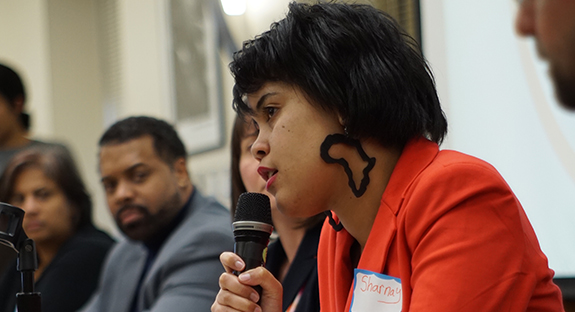Gaining Perspective on Volunteering and Facing the Unfamiliar

Whether it’s helping to plan community gardens or assisting at after-school programs, there is a lot of work to be done in Pittsburgh’s underserved neighborhoods. College students are often called upon to help, but might not be fully prepared for what they could encounter.
That was the focus of a panel discussion called “Being Comfortable Being Uncomfortable,” held March 17 at the University of Pittsburgh School of Social Work and sponsored by the student group Race and Community Engagement Alliance and the University Honors College. About 50 young people interested in volunteering turned out to hear from a panel of six experts on community engagement.
“You could find yourself in a situation that is different from your own politics,” said panelist Waverly Duck, an assistant professor of sociology at Pitt. “There are issues of gender, race and sexuality. But the student volunteer must start from a place of respect.”
Fred Brown, president and CEO of the Homewood Children’s Village, told the group it’s important to confront fears or feelings of uneasiness in order to get past them.
Student moderator Alexis Whitaker agreed. An anthropology major on the pre-med track, she is an intern with Pitt-Assisted Communities & Schools, the School of Social Work unit that is currently focused on assisting schools, parents and students in Homewood in particular.
Many young people are unaware of the trauma underserved communities experience, “so some humility and sensitivity is needed,” Whitaker said. “Being of service to someone doesn’t mean storming in and pushing your own beliefs upon those who have invited you to be there. As an outsider, you are there to help, not conquer.”
Other panelists were Sharnay Hearn, director of the Hill House Association First Source Center; Lina Dostilio, Pitt’s new assistant vice chancellor for Community Engagement Centers; Mark Kramer, lecturer in the Pitt Department of English Writing Program and anupama jain, a part-time instructor in Pitt’s Gender, Sexuality and Women’s Studies Program.
Pitt sophomore John Gnalian, a biology major from the North Hills and the advocacy chair for the South Asian Student Association, said he’s been encouraging his group members to volunteer at interfaith organizations and at the Islamic Center of Pittsburgh. He admits to being unfamiliar with underserved pockets of the region.
“Growing up in the North Allegheny area, I’m completely sheltered from city life,” he said.
“You have to force yourself to be uncomfortable and that’s what drove me to this dialogue today.”
***
If you’re interested in volunteering, PittServes has opportunities for students, faculty and staff, with some options more student-centric and others more oriented toward nonstudents. Pitt Assisted Communities and Schools, through Pitt’s School of Social Work, also provides volunteer opportunities specifically in Homewood.
And once you’re set to volunteer, the panel experts offered a few thoughts to keep in mind:
- Be aware that you are there to help, not to make decisions. Let the community lead.
- Remember that you are an equal and respect everyone you meet.
- Learn about the area you are serving and the people in that community.
- Remain flexible and accept that things don’t always go as planned.
- Aim to understand the context of your work and strive to develop cultural awareness.
- Make sure the opportunity is something to which you can truly commit — don’t start then walk away.
Other Stories From This Issue
On the Freedom Road

Follow a group of Pitt students on the Returning to the Roots of Civil Rights bus tour, a nine-day, 2,300-mile journey crisscrossing five states.
Day 1: The Awakening
Day 2: Deep Impressions
Day 3: Music, Montgomery, and More
Day 4: Looking Back, Looking Forward
Day 5: Learning to Remember
Day 6: The Mountaintop
Day 7: Slavery and Beyond
Day 8: Lessons to Bring Home
Day 9: Final Lessons

